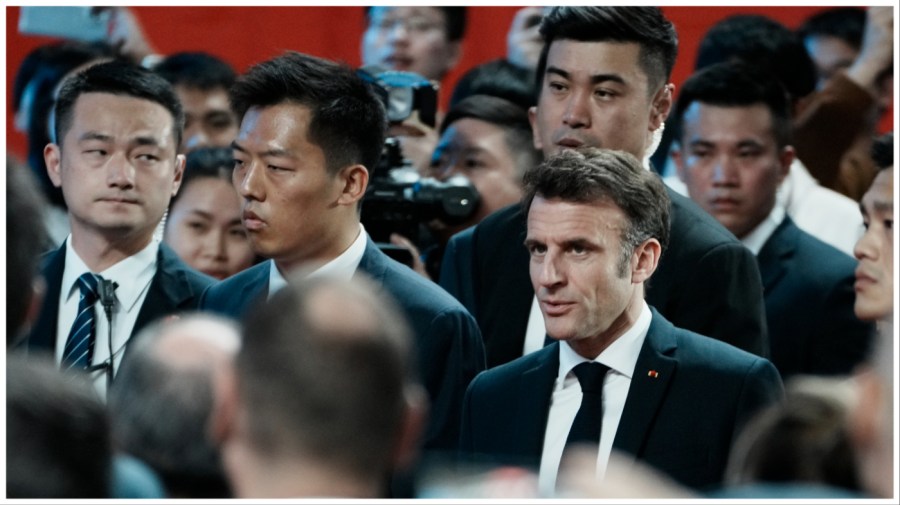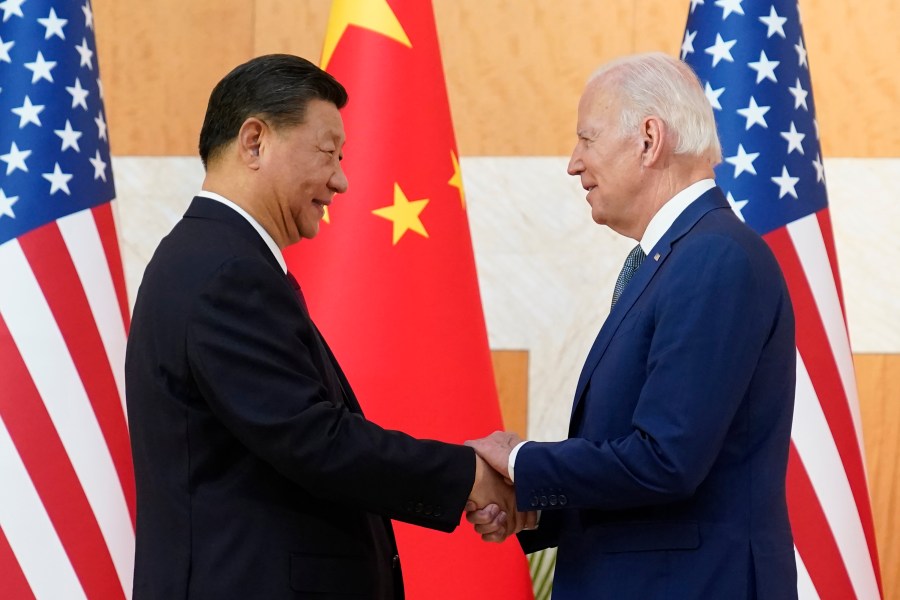French outreach to China highlights Europe’s divide with US
High-profile diplomatic meetings on opposite sides of the world are underscoring growing tensions between the U.S. and Europe in how to engage with China.
French President Emmanuel Macron, on a three-day trip to China, is billing his outreach as an effort to recruit Chinese President Xi Jinping to play a major role in building peace between Ukraine and Russia, with an eye on reining in Russian President Vladimir Putin.
The summit comes as Chinese officials have warned of consequences and retaliation in response to House Speaker Kevin McCarthy (R-Calif) hosting Taiwan’s President Tsai Ing-wen in California this week.
McCarthy, speaking to reporters following his meeting with Tsai, said he hoped Macron asked Xi not to “fund Russia’s war in Ukraine” and reiterated that “democracy makes the world safer and stronger.”
“I hope he delivers a message that Americans meeting with President Tsai is positive for the same aspect that he is meeting with President Xi,” he said.
The dueling diplomatic summits highlight the gap between the U.S. and Europe over how to deal with China.
While the Biden administration and lawmakers on both sides of the aisle describe Xi as working to reshape the world in the view of China’s authoritarian model, European leaders are less unified on the risks versus rewards of close ties with Beijing.
The Élysée Palace said Macron and President Biden, in a call ahead of the French leader’s trip, discussed a “common desire to engage China to accelerate the end of the war in Ukraine and to participate in building a lasting peace in the region.”
The administration was more reserved in its description of the conversation. A two-line readout from the White House simply stated that Biden and Macron talked about the French president’s upcoming travel and reiterated support for Ukraine.
France’s approach: Seek peace, maintain economic ties
Macron’s visit, accompanied by dozens of business officials, highlights France’s focus on maintaining, if not strengthening, economic ties to China, even as the U.S. has for months warned that Beijing is considering sending weapons to Russia for use in its war in Ukraine.
“I am convinced that China has a major role to play in building peace. This is what I have come to discuss, to move forward on,” Macron tweeted on Thursday. “With President Xi Jinping, we will also talk about our businesses, the climate and biodiversity, and food security.”
Xi has sought to portray himself as a global peacemaker. Alongside Macron on Thursday in Beijing, he said China is committed to facilitating peace talks and a settlement on “the Ukraine crisis,” affirmed that a nuclear war should never be fought, and that “legitimate security concerns of all parties” should be taken into account.

French officials say they do not see a conflict of interest between maintaining trade ties with China while trying to engage Xi to act more responsibly.
“Talking with China and having direct engaging discussions doesn’t mean you erase the economic ties,” one French diplomat told The Hill.
“Personal engagement is even more important with China, after three years of pandemic, and considering the nature of the regime,” the diplomat continued, a reference to Xi’s near total power over the state.
How Europe, US differ on China
But critics say that Macron’s coterie of business executives undermines any effort to push Xi to get tough on Russia.
“In a situation where we’re trying to talk strategy with the Chinese, trying to get them to commit not to deliver weapons to Russia, bringing along so many business people with all deals in their minds, and Euro signs in their pupils, is the wrong signal,” said Roland Freudenstein, vice president and head of GLOBSEC Brussels, a think tank based in Slovakia. “It means that you come with a carrot, but you don’t come with a stick, and any talk of the stick is not valid at that moment.”
Other experts though said that Macron should not be made into a boogeyman from this visit to China, considering that Europe has business interests to maintain in China.
“Both the U.S. and Europe have this new sort of idea that China is a rival, a partner, and a competitor. For the U.S., the ordering is probably rival first, then competitor, then partner. For Europe, that used to be the other way around,” said Matthias Matthijs, European expert at the Council on Foreign Relations.
“The Europeans are slowly moving closer to the American line on China, but the U.S. has also moved very aggressively in a different direction than, say, it was during the Obama administration, and the Europeans aren’t quite there yet because they have no reason to be,” added Matthijs, also a professor of international political economy at Johns Hopkins University’s School of Advanced International Studies.
Biden and Xi have not spoken since they met in Bali, Indonesia, on the sidelines of the Group of 20 Summit in November, but Biden said he would talk to Xi in the wake of the Chinese spy balloon traversing the United States in February.
When asked about the phone call between Biden and Macron, national security council spokesman John Kirby on Wednesday declined to provide further details but said the president was “grateful” that Macron called him before his trip to Beijing.
“We still urge China, that if they truly want to accelerate an end to the war, to join the rest of the international community in condemning what Mr. Putin is doing,” Kirby said.
“China has a relationship with them, so, we’ve said this before, we’d like to see them put more pressure on Mr. Putin to end this war. And if they really do believe in a sustainable peace, then they could do that.”

Europe, though, is less concerned than the U.S. is about China providing weapons to Russia, mainly because China is already buying oil and gas that help Putin’s regime stay afloat, Matthijs argued.
“I don’t think it isn’t a red line [for Europe], I just don’t think it’s something that is a very high-risk scenario. If there were to be evidence, I think Europe would get closer to the U.S.’s line on this, but they’re just not convinced the Chinese are willing to go there,” he said.
Europe itself is split on China
But not all European leaders share France’s view of China.
European Commission President Ursula von der Leyen, who accompanied Macron on his trip, has staked out a more hawkish position, calling Beijing “more repressive at home and more assertive abroad,” and saying Europe should “derisk” in its economic ties with China.
“Far from being put off by the atrocious and illegal invasion of Ukraine, President Xi is maintaining his ‘no-limits friendship’ with Putin,” von der Leyen said in major speech about China late last month.
“How China continues to interact with Putin’s war will be a determining factor for EU-China relations going forward,” she said.
Her hawkish approach is viewed as more in line with central and eastern European countries, which have split with mainstream views from France and Germany that engagement with China can help deter aggression.
Lithuania is on the frontlines of calling out China’s malintent. China decreased Lithuanian imports in 2021 by 80 percent after Vilnius deepened economic ties with Taiwan. And Czechia and Slovakia, Freudenstein said, are increasingly aligned with Vilnius.
“While the general trend is negative, even in France and Germany, you have, in my view, an increasing cleavage between most of the eastern flank countries, and then Britain, on the one hand,” he said, “and continental western and southwestern Europe on the other. And the latter club hasn’t completely given up on China.”
Still, there’s also concern about the future of the U.S., and if the 2024 presidential election ushers in an isolationist Republican administration that will undo the Biden administration’s efforts at rebuilding ties with Europe that were severely strained during the former Trump presidency.
“There’s a relief in Europe with Biden being so engaged, but there’s always at the same time an apprehension that this could all go sideways in the next two years,” Matthijs said.
Copyright 2024 Nexstar Media Inc. All rights reserved. This material may not be published, broadcast, rewritten, or redistributed..











